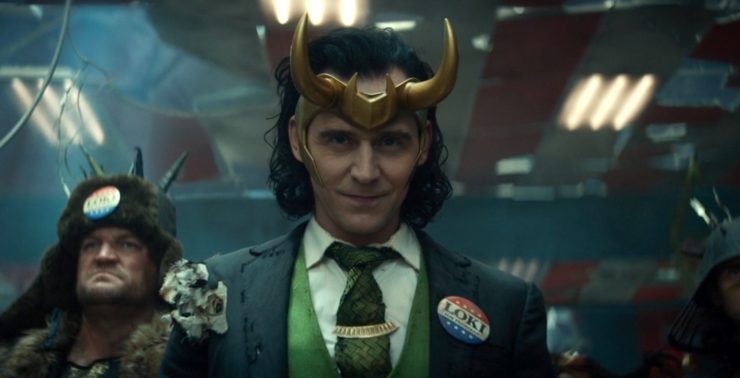Can you call something a Void when it’s not particularly void-like? Guess we’ll find out. The word of the day is: blanket (not tablecloth).
Summary
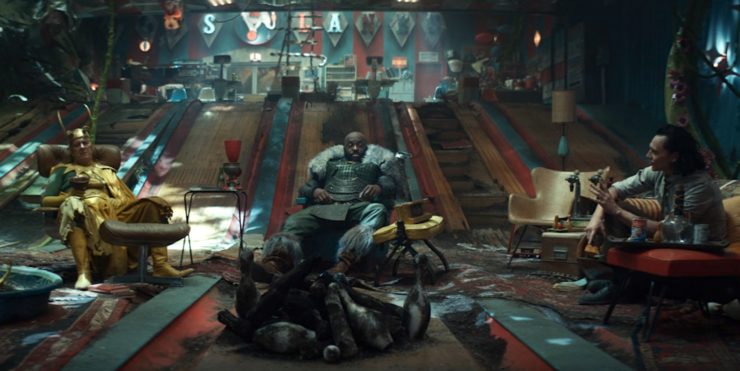
Loki has arrived where the TVA dumps their trash—turns out when something is “pruned” by their hunters, it actually gets transported to the end of time, to a place called the Void. There, a monstrous cloud called Alioth devours everything. Loki meets four new variants of himself who direct him to their underground hiding place. The group are ruled by the child variant of Loki, a version who was pruned because he killed Thor in his reality. Back at the TVA, Renslayer agrees to work with Sylvie to figure out what’s going on—or rather, she pretends to as a tactic to stall for time and get backup, still determined to do as the TVA commands. She’s told Sylvie about the Void and the end of time, though, so Sylvie makes the choice to prune herself and see if she can’t find Loki there. She is saved by Mobius, driving a pizza delivery car.
While Loki and his variants chill out and talk about the differences between them, they are suddenly attacked by politician Loki and his army of goons. This is all a ploy done by Boastful Loki, who erroneously believed he had struck a bargain with the other to betray his comrades and get access to the other’s army. A fight ensues, with Classic, Kid, and Reptile Loki all escaping with our Loki to another part of the Void. Loki wants to band together and try to kill Alioth, something they don’t believe is possible. Renslayer has a talk with B-15, who is being held in a cell for her betrayal. She believes that Sylvie will outwit them all and get what she wants.
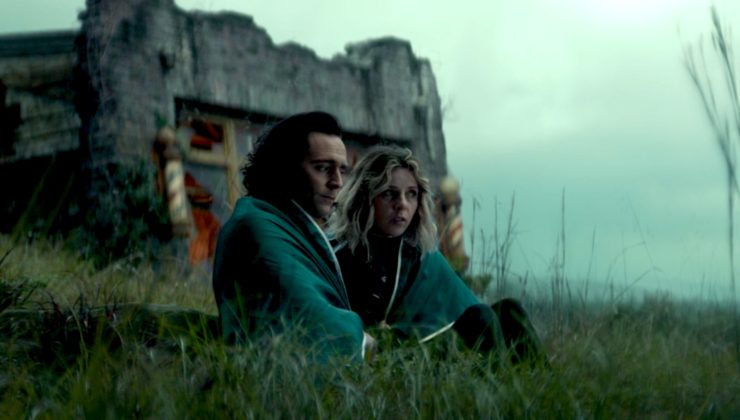
Sylvie and Mobius find the Loki group, but Sylvie has a different plan: She wants to enchant Alioth, having made brief contact with the creature’s mind on arrival. She and Loki have a brief heart to heart where they both admit that they’re not accustomed to having friends, and Loki promises not to betray her because he’s changed. The other Loki variants aren’t interested in the enchanting plan, and they bail. Sylvie gives Mobius her TemPad, and he agrees to head back and burn the TVA to the ground. Loki wants to stay with Sylvie, so he and Mobius share a hug, and the former TVA agent vanishes through a temporal doorway.
Loki and Sylvie go to face off against Alioth, with Loki serving as Sylvie’s distraction, but he’s not enough to get her plan off the ground. Thankfully, Classic Loki shows up and creates an illusion of the whole of Asgard, giving them the time they need to get into the creature’s mind, though not before he’s killed. Once the enchantment takes hold, Alioth dissolves, revealing a large manor on the other side of the smoke. Sylvie and Loki head toward it together.
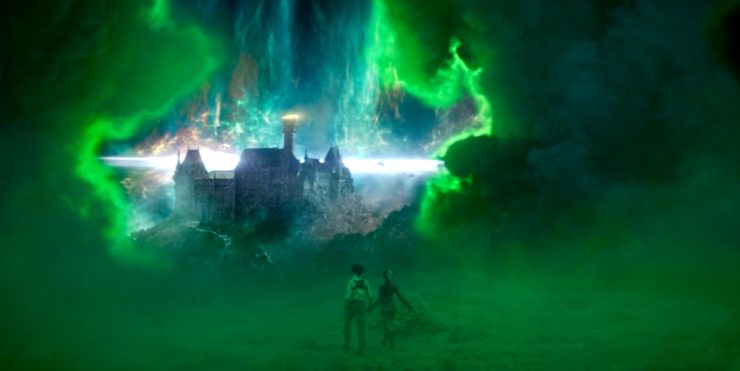
Commentary
Only one more week. Thank the All-father because I genuinely can’t take more of this.
This show is a mess. On a plot level, on a scripting level, on a set up for further projects level, I just… I’m shocked that they allowed this through. After the sheer volume of work clearly done on WandaVision and Falcon and the Winter Soldier to make them stand alone and move things forward and create meaningful stories for underserved characters, Marvel takes one of their strongest antagonists—and actors—and saddles us with this. It’s heartbreaking. And what’s more, it’s the only show of these first batch of MCU television offerings that is meant to get more seasons. How about we just leave off on that plan?

So, the love story aspect is entirely intentional, according to showrunner Michael Waldron; it was part of his pitch for the series, the idea that a show about learning to love yourself should take that conceit literally and make Loki’s “first love” about falling in love with a variant of himself. There are several issues with this, prime among them being that Loki has known Sylvie for all of a few days, even if they are essentially the same person. Which, let’s unpack that actually, because the show keeps intimating that it’s saying a lot about identity without ever saying anything at all. All the Loki variants (and Mobius) keep going on about what makes a Loki, and they all have different ideas on that front. Classic Loki believes they are the god of outcasts. There’s the suggestion that they always lose, or that they always have a plan, or that they always survive. These are all things that a person can do, sure, but none of them say anything at all about what constitutes selfhood.
Is a person their intentions? Their actions? Their experiences? Their relationships or history? Their soul, if you believe in that sort of thing? Their personal philosophy, or moral reasoning? You could make arguments for any of these things, but the show hasn’t, so claiming that this is a story about the self and reflection upon that is meaningless. It’s not interesting to have Loki fall in love with himself when the series has given us no indication of what that means to him—is he surprised? Moved? Is this the first time he believes he has ever truly loved himself in any capacity? And what about Sylvie warrants this affection? Because, according to him, it’s the fact that she was the only variant who thought to destroy the TVA, which… okay. What about that makes her your dreamgirl, my dude? Could anyone on staff write some dialogue expounding upon that for more than one sentence, so we could get a read on the situation?
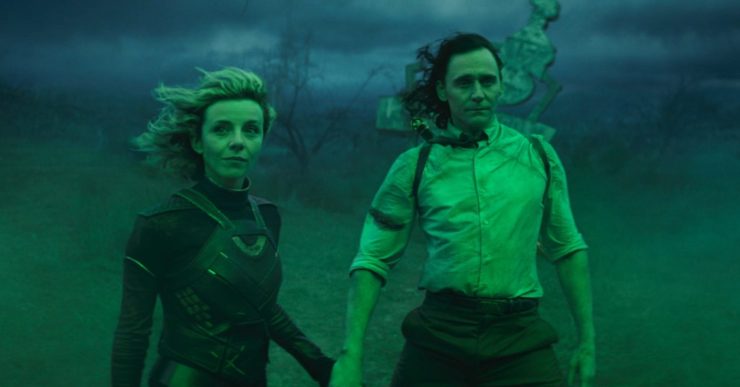
What irks the most is that Waldron said outright he thought this was the angle to take on because it made sense with the show’s arc turning on the concept of self-love. But he also acknowledged that there was some balking, even on his own behalf initially, because the people involved wondered if it was “too crazy.” And you know what? It’s not too crazy. It’s not even a little weird and wild. This is science fiction, y’all—do you somehow think this concept has never come up before? These are the ABCs of the genre. The New Wave era was fifty years ago, and it got up to weirder shit than this. Comics regularly pull stranger ideas out of the hat without blinking an eye, and throw them out just as quickly.
But what is too crazy is the fact that they could only conceive of pulling off this relationship if it appeared, outwardly, to be heterosexual.
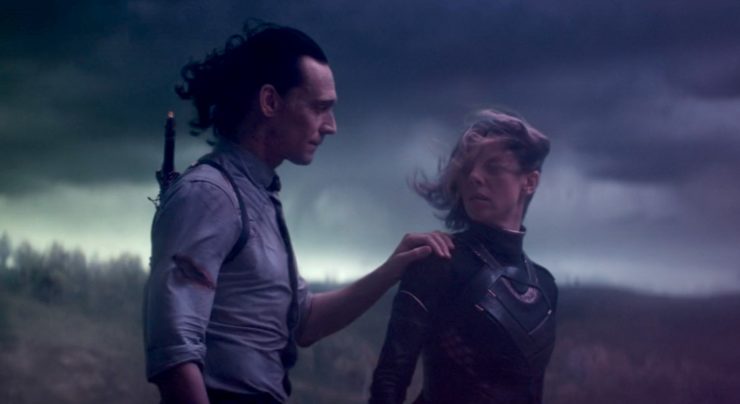
Because, make no mistake, that is the only reason a woman variant of Loki was introduced here. There are folks who will clamor to remind us that both of these versions of Loki are canonically bisexual at least, making the relationship functionally not straight… but that is unimportant in this specific instance. The point is how it looks to viewers who aren’t keen on accepting that truth, and Marvel engineered this in such a way that nothing about it reads as queer—or even awkwardly I’m-into-my-clone, which would have been something, at least. They got so impressed with their own supposed edginess that they managed to create the most “normie” version of this scenario that anyone could put down on paper. And now we have to suffer through it and their insistence that it’s interesting. Oh look, Loki fell in love with blonde lady Loki. How shocking. How utterly unprecedented.
Let’s not even bother to get into the fact that this means they also created a lady Loki for the central purpose of having her be a love interest to the main character, because I don’t need more things to be angry about right now.
And this, as I feared, basically negates the idea of Loki being genderfluid because his shifting ability has been erased from the MCU, and there’s been no mention of said fluidity in any other capacity. Sylvie just happens to be a female variant, for some reason that they aren’t revealing to us, the same way we don’t know why there’s an alligator version? As I’ve pointed out previously, the refusal to get gritty with these definitions and show us any indication of active, present fluidity within Loki is a cheat. It hurts non-binary and genderfluid people. These reveals are as disappointing as the show could have managed on every level, and it’s somehow still not over.
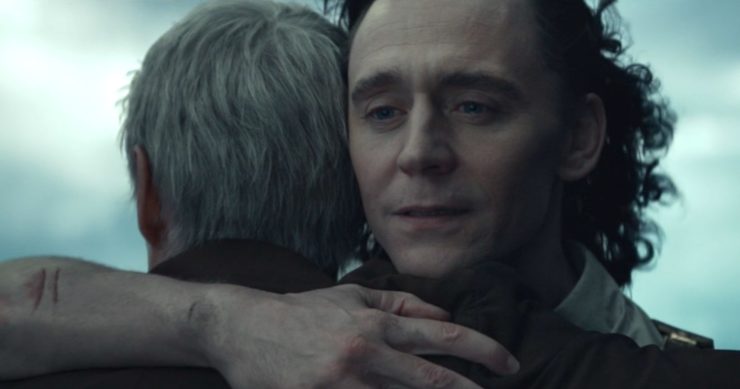
You know what would have been great? An entire story that centered on getting Loki some of his own friends, and one of them happens to be himself! Because that’s always been a point of hurt surrounding the character, revolving constantly around Thor and Thor’s friends and Thor’s teammates—they could have done something lovely here about how Loki needs to develop his own support network and identity away from his brother and that would have been great. They halfway go there with Mobius, giving us that sweet hug. They could have been going for it with Sylvie if they’d just kept that conversation away from any talk of building a future together.
Aside from all that, we get to see Richard E. Grant having a blast being maniacal, DeObia Oparei get underused and then insultingly cast aside, and the kid is… well, he’s the kid version who killed Thor, and we’re apparently not supposed to want to know more about that. (I do, though. I also want to know why the other three actually follow him, aside from creating this Peter Pan scenario with their weirdo hideout.) Also, we’re supposed to believe that the creepy smoke monster can’t discern them underground, for some reason.
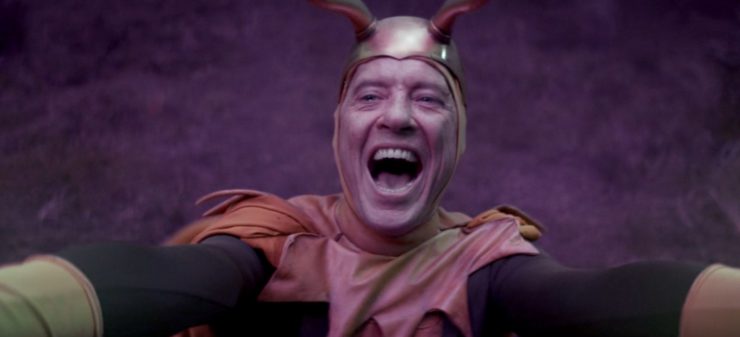
End of time scenarios are used frequently on sci-fi shows, and also very famously in the works of author Michael Moorcock, who managed to make the whole concept infinitely stranger and more interesting. Guess the creative team never bothered to look up other examples when they constructed this universal garbage heap. (Also, Thor: Ragnarok’s Sakaar was literally a universal trash dump, but they must think their version is differenter enough?)
The thing I really can’t get over, though, is how bad the dialogue is, and how it seems to be getting worse rather than better as the show goes on. Often good actors can save a poor script, but there’s nothing to be done here. This truly stellar cast is trying so hard, but nothing can make a trite line like “You only want it… she needs it” work on camera. Nothing can save an overwrought this-is-our-theme button like “I think we’re stronger than we realize.” It’s depressingly awful all the way through, a few cute one-liners aside.
They’re still pulling the same old “women are better—that’s feminisms, right?” dynamic with Loki and Sylvie, with him saying that he plans to kill Alioth, and her insisting that’s ridiculous and she’ll just enchant the thing while Mobius looks on approvingly. Look: They’re both terrible plans. We can just say that. They’re the same person; they can both have bad ideas. It’s makes no sense whatsoever that Sylvie can get into a smoke creature’s head anymore than the idea that Loki could murder it. They could have gone for a clever dig here, like “You’re thinking like Thor instead of you, and that’s why the plan won’t work,” but instead we’re just supposed to laugh because being the female variant means you have more common sense, or something.

And next week we’ll find out who is truly pulling the strings. There are plenty of options here, of course. It could be another Loki variant (the King Loki iteration is generally used as the “true villain” version in more recent comics), but other popular theories have swirled around Kang the Conqueror. Honestly, I would prefer someone totally random at this point. What’s Doctor Doom up to right now?
Thoughts and Asides:
- The title of this episode is a reference to the comics series of the same name, initially a horror series first run by Atlas Comics and then by Marvel, which succeeded the company. Journey into Mystery was the series that introduced the Thor wing of the Marvelverse in 1962.
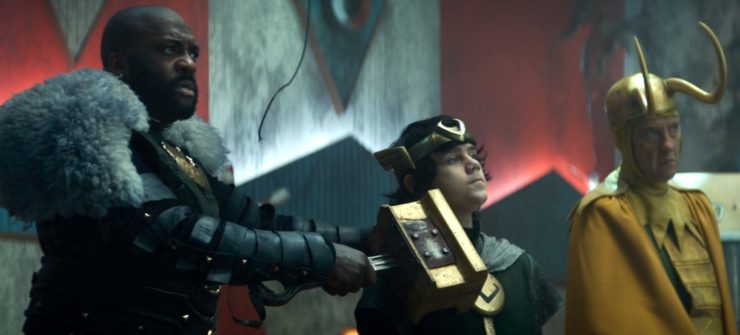
- The other Loki variant played by Hiddleston is based on the Vote Loki four-part series written by Chris Hastings (of Doctor McNinja fame) during the lead up to the 2016 presidential election. It was a scathing book of political satire, so it seems a waste that he was used for a throwaway reference, really.
- The entirety of the Void is just a barrage of references that are cute to note, but don’t do anything for the overall story, which kinda sucks when there’s not much story elsewhere. Oh look, a Thanos helicopter. Gee, let’s make a random reference to the Philadelphia Experiment with the USS Eldridge? Hey, there’s Mjolnir!
- I will keep Kid Loki drinking Hi-C, though.
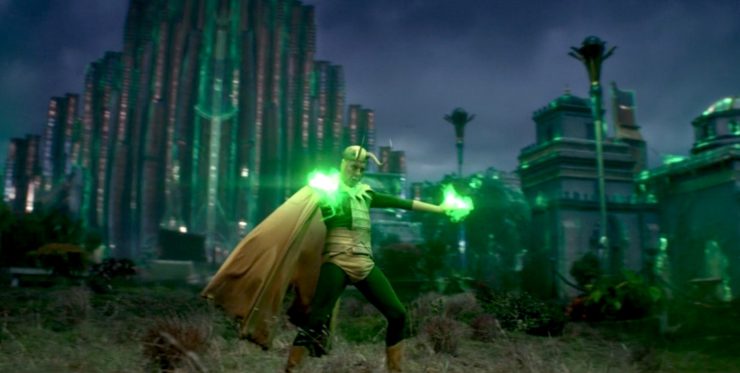
- Projecting an illusion of the entirety of Asgard was pretty darn cool. RIP Classic Loki, who got pruned for missing his brother too much. Unless he turns out to be the villain here all along, which is just as likely as anything, idk.
See you in Valhalla, maybe. Next week.
Emmet Asher-Perrin just wanted a show that was fun? Apparently that was too much to ask. You can bug them on Twitter, and read more of their work here and elsewhere.










